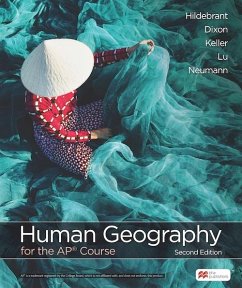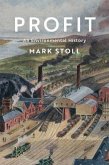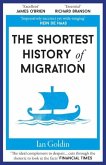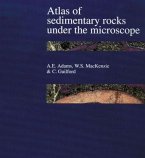- Gebundenes Buch
- Merkliste
- Auf die Merkliste
- Bewerten Bewerten
- Teilen
- Produkt teilen
- Produkterinnerung
- Produkterinnerung
Human Geography for the AP® Course, 2nd edition, stands out for its strong 100% alignment with the AP® Human Geography CED. Featuring a modular layout that appeals to high school students of all levels, the text offers engaging content with real-world investigations. Packed with comprehensive AP® exam guidance, instruction, and top-notch practice features like skills workshops, FRQs, and inquiry learning, this program ensures unparalleled preparation for APHG. Created by expert AP® Human Geography educators with hands-on world experience in human geography, the program also provides extensive Teacher Resources, including an Annotated Teacher's Edition.…mehr
Andere Kunden interessierten sich auch für
![Introduction to Physical Hydrology Introduction to Physical Hydrology]() Martin Hendriks (Utrecht University Faculty of Geosciences)Introduction to Physical Hydrology51,99 €
Martin Hendriks (Utrecht University Faculty of Geosciences)Introduction to Physical Hydrology51,99 €![Profit Profit]() Mark Stoll (Texas Tech University)Profit50,99 €
Mark Stoll (Texas Tech University)Profit50,99 €![The Shortest History of Migration The Shortest History of Migration]() Ian GoldinThe Shortest History of Migration11,99 €
Ian GoldinThe Shortest History of Migration11,99 €![The Future of Geography The Future of Geography]() Tim MarshallThe Future of Geography36,99 €
Tim MarshallThe Future of Geography36,99 €![The Shortest History of Migration The Shortest History of Migration]() Ian GoldinThe Shortest History of Migration19,99 €
Ian GoldinThe Shortest History of Migration19,99 €![Atlas of Sedimentary Rocks Under the Microscope Atlas of Sedimentary Rocks Under the Microscope]() A.E. AdamsAtlas of Sedimentary Rocks Under the Microscope129,99 €
A.E. AdamsAtlas of Sedimentary Rocks Under the Microscope129,99 €![The SAGE Handbook of Geomorphology The SAGE Handbook of Geomorphology]() The SAGE Handbook of Geomorphology54,99 €
The SAGE Handbook of Geomorphology54,99 €-
-
-
Human Geography for the AP® Course, 2nd edition, stands out for its strong 100% alignment with the AP® Human Geography CED. Featuring a modular layout that appeals to high school students of all levels, the text offers engaging content with real-world investigations. Packed with comprehensive AP® exam guidance, instruction, and top-notch practice features like skills workshops, FRQs, and inquiry learning, this program ensures unparalleled preparation for APHG. Created by expert AP® Human Geography educators with hands-on world experience in human geography, the program also provides extensive Teacher Resources, including an Annotated Teacher's Edition.
Produktdetails
- Produktdetails
- Verlag: Macmillan Learning
- Second Edition
- Seitenzahl: 944
- Erscheinungstermin: 15. April 2025
- Englisch
- Abmessung: 282mm x 240mm x 37mm
- Gewicht: 2382g
- ISBN-13: 9781319535810
- ISBN-10: 131953581X
- Artikelnr.: 72542259
- Herstellerkennzeichnung
- Libri GmbH
- Europaallee 1
- 36244 Bad Hersfeld
- gpsr@libri.de
- Verlag: Macmillan Learning
- Second Edition
- Seitenzahl: 944
- Erscheinungstermin: 15. April 2025
- Englisch
- Abmessung: 282mm x 240mm x 37mm
- Gewicht: 2382g
- ISBN-13: 9781319535810
- ISBN-10: 131953581X
- Artikelnr.: 72542259
- Herstellerkennzeichnung
- Libri GmbH
- Europaallee 1
- 36244 Bad Hersfeld
- gpsr@libri.de
Module 0: An Introduction to Human Geography
AP® Skills Workshop: Task Verbs
Unit 1: Thinking Geographically
Module 1: Introduction to Maps
Module 2: Geographic Data
Module 3: Spatial Concepts and Types of Diffusion
Module 4: Human-Environmental Interaction
Module 5: Scales of Analysis
Module 6: Regional Analysis
AP® Skills Workshop: Concepts and Processes
Unit 2: Population and Migration Patterns and Processes
Module 7: Population Distribution and Its Consequences
Module 8: Population Composition
Module 9: Population Dynamics
Module 10: The Demographic Transition Model
Module 11: Malthusian Theory
Module 12: Population Policies
Module 13: Women and Demographic Change
Module 14: Aging Populations
Module 15: Causes of Migration
Module 16: Forced and Voluntary Migration
Module 17: Effects of Migration
AP® Skills Workshop: Spatial Relationships
Unit 3: Cultural Patterns and Processes
Module 18: Introduction to Culture
Module 19: Cultural Landscapes
Module 20: Cultural Patterns
Module 21: Types of Diffusion and Their Historical Causes
Module 22: Contemporary Causes of Diffusion
Module 23: Diffusion of Language and Religion
Module 24: Effects of Diffusion
AP® Skills Workshops: Data Analysis
Unit 4: Political Patterns and Processes
Module 25: Introduction to Political Geography
Module 26: Political Geography
Module 27: Political Power and Territoriality
Module 28: Types and Functions of Political Boundaries
Module 29: Internal Political Boundaries
Module 30: Forms of Governance
Module 31: Challenges to State Sovereignty: Devolution and Supranationalism
Module 32: Consequences of Centrifugal and Centripetal Forces
AP® Skills Workshop: Source Analysis
Unit 5: Agriculture and Rural Land-Use Patterns and Processes
Module 33: Introduction to Agriculture
Module 34: Settlement Patterns and Survey Methods
Module 35: Agriculture Origins and Diffusions
Module 36: The Second Agricultural Revolution
Module 37: The Green Revolution
Module 38: Agricultural Practices and Economic Forces
Module 39: The Von Thunen Model
Module 40: The Global System of Agriculture
Module 41: Consequences of Agricultural Practices
Module 42: Challenges of Contemporary Agriculture
Module 43: Women in Agriculture
AP® Skills Workshop: Scale Analysis
Unit 6: Cities and Urban Land-Use Patterns and Processes
Module 44: The Origin and Influences of Urbanization
Module 45: Cities Across the World
Module 46: Cities and Globalization
Module 47: The Size and Distribution of Cities
Module 48: The Internal Structure of Cities
Module 49: Density, Land Use, and Infrastructure
Module 50: Urban Sustainability
Module 51: Challenges of Urban Changes
Module 52: Challenges of Urban Sustainability
Unit 7: Industrial and Economic Development Patterns and Processes
Module 53: The Industrial Revolution
Module 54: Economic Sectors and Patterns
Module 55: Theories and Measures of Development
Module 56: Women and Economic Development
Module 57: Trade and the World Economy
Module 58: Changes as a Result of the World Economy
Module 59: Sustainable Development
Complete AP® Practice Exam
Glossary/Glosario
AP® Skills Workshop: Task Verbs
Unit 1: Thinking Geographically
Module 1: Introduction to Maps
Module 2: Geographic Data
Module 3: Spatial Concepts and Types of Diffusion
Module 4: Human-Environmental Interaction
Module 5: Scales of Analysis
Module 6: Regional Analysis
AP® Skills Workshop: Concepts and Processes
Unit 2: Population and Migration Patterns and Processes
Module 7: Population Distribution and Its Consequences
Module 8: Population Composition
Module 9: Population Dynamics
Module 10: The Demographic Transition Model
Module 11: Malthusian Theory
Module 12: Population Policies
Module 13: Women and Demographic Change
Module 14: Aging Populations
Module 15: Causes of Migration
Module 16: Forced and Voluntary Migration
Module 17: Effects of Migration
AP® Skills Workshop: Spatial Relationships
Unit 3: Cultural Patterns and Processes
Module 18: Introduction to Culture
Module 19: Cultural Landscapes
Module 20: Cultural Patterns
Module 21: Types of Diffusion and Their Historical Causes
Module 22: Contemporary Causes of Diffusion
Module 23: Diffusion of Language and Religion
Module 24: Effects of Diffusion
AP® Skills Workshops: Data Analysis
Unit 4: Political Patterns and Processes
Module 25: Introduction to Political Geography
Module 26: Political Geography
Module 27: Political Power and Territoriality
Module 28: Types and Functions of Political Boundaries
Module 29: Internal Political Boundaries
Module 30: Forms of Governance
Module 31: Challenges to State Sovereignty: Devolution and Supranationalism
Module 32: Consequences of Centrifugal and Centripetal Forces
AP® Skills Workshop: Source Analysis
Unit 5: Agriculture and Rural Land-Use Patterns and Processes
Module 33: Introduction to Agriculture
Module 34: Settlement Patterns and Survey Methods
Module 35: Agriculture Origins and Diffusions
Module 36: The Second Agricultural Revolution
Module 37: The Green Revolution
Module 38: Agricultural Practices and Economic Forces
Module 39: The Von Thunen Model
Module 40: The Global System of Agriculture
Module 41: Consequences of Agricultural Practices
Module 42: Challenges of Contemporary Agriculture
Module 43: Women in Agriculture
AP® Skills Workshop: Scale Analysis
Unit 6: Cities and Urban Land-Use Patterns and Processes
Module 44: The Origin and Influences of Urbanization
Module 45: Cities Across the World
Module 46: Cities and Globalization
Module 47: The Size and Distribution of Cities
Module 48: The Internal Structure of Cities
Module 49: Density, Land Use, and Infrastructure
Module 50: Urban Sustainability
Module 51: Challenges of Urban Changes
Module 52: Challenges of Urban Sustainability
Unit 7: Industrial and Economic Development Patterns and Processes
Module 53: The Industrial Revolution
Module 54: Economic Sectors and Patterns
Module 55: Theories and Measures of Development
Module 56: Women and Economic Development
Module 57: Trade and the World Economy
Module 58: Changes as a Result of the World Economy
Module 59: Sustainable Development
Complete AP® Practice Exam
Glossary/Glosario
Module 0: An Introduction to Human Geography
AP® Skills Workshop: Task Verbs
Unit 1: Thinking Geographically
Module 1: Introduction to Maps
Module 2: Geographic Data
Module 3: Spatial Concepts and Types of Diffusion
Module 4: Human-Environmental Interaction
Module 5: Scales of Analysis
Module 6: Regional Analysis
AP® Skills Workshop: Concepts and Processes
Unit 2: Population and Migration Patterns and Processes
Module 7: Population Distribution and Its Consequences
Module 8: Population Composition
Module 9: Population Dynamics
Module 10: The Demographic Transition Model
Module 11: Malthusian Theory
Module 12: Population Policies
Module 13: Women and Demographic Change
Module 14: Aging Populations
Module 15: Causes of Migration
Module 16: Forced and Voluntary Migration
Module 17: Effects of Migration
AP® Skills Workshop: Spatial Relationships
Unit 3: Cultural Patterns and Processes
Module 18: Introduction to Culture
Module 19: Cultural Landscapes
Module 20: Cultural Patterns
Module 21: Types of Diffusion and Their Historical Causes
Module 22: Contemporary Causes of Diffusion
Module 23: Diffusion of Language and Religion
Module 24: Effects of Diffusion
AP® Skills Workshops: Data Analysis
Unit 4: Political Patterns and Processes
Module 25: Introduction to Political Geography
Module 26: Political Geography
Module 27: Political Power and Territoriality
Module 28: Types and Functions of Political Boundaries
Module 29: Internal Political Boundaries
Module 30: Forms of Governance
Module 31: Challenges to State Sovereignty: Devolution and Supranationalism
Module 32: Consequences of Centrifugal and Centripetal Forces
AP® Skills Workshop: Source Analysis
Unit 5: Agriculture and Rural Land-Use Patterns and Processes
Module 33: Introduction to Agriculture
Module 34: Settlement Patterns and Survey Methods
Module 35: Agriculture Origins and Diffusions
Module 36: The Second Agricultural Revolution
Module 37: The Green Revolution
Module 38: Agricultural Practices and Economic Forces
Module 39: The Von Thunen Model
Module 40: The Global System of Agriculture
Module 41: Consequences of Agricultural Practices
Module 42: Challenges of Contemporary Agriculture
Module 43: Women in Agriculture
AP® Skills Workshop: Scale Analysis
Unit 6: Cities and Urban Land-Use Patterns and Processes
Module 44: The Origin and Influences of Urbanization
Module 45: Cities Across the World
Module 46: Cities and Globalization
Module 47: The Size and Distribution of Cities
Module 48: The Internal Structure of Cities
Module 49: Density, Land Use, and Infrastructure
Module 50: Urban Sustainability
Module 51: Challenges of Urban Changes
Module 52: Challenges of Urban Sustainability
Unit 7: Industrial and Economic Development Patterns and Processes
Module 53: The Industrial Revolution
Module 54: Economic Sectors and Patterns
Module 55: Theories and Measures of Development
Module 56: Women and Economic Development
Module 57: Trade and the World Economy
Module 58: Changes as a Result of the World Economy
Module 59: Sustainable Development
Complete AP® Practice Exam
Glossary/Glosario
AP® Skills Workshop: Task Verbs
Unit 1: Thinking Geographically
Module 1: Introduction to Maps
Module 2: Geographic Data
Module 3: Spatial Concepts and Types of Diffusion
Module 4: Human-Environmental Interaction
Module 5: Scales of Analysis
Module 6: Regional Analysis
AP® Skills Workshop: Concepts and Processes
Unit 2: Population and Migration Patterns and Processes
Module 7: Population Distribution and Its Consequences
Module 8: Population Composition
Module 9: Population Dynamics
Module 10: The Demographic Transition Model
Module 11: Malthusian Theory
Module 12: Population Policies
Module 13: Women and Demographic Change
Module 14: Aging Populations
Module 15: Causes of Migration
Module 16: Forced and Voluntary Migration
Module 17: Effects of Migration
AP® Skills Workshop: Spatial Relationships
Unit 3: Cultural Patterns and Processes
Module 18: Introduction to Culture
Module 19: Cultural Landscapes
Module 20: Cultural Patterns
Module 21: Types of Diffusion and Their Historical Causes
Module 22: Contemporary Causes of Diffusion
Module 23: Diffusion of Language and Religion
Module 24: Effects of Diffusion
AP® Skills Workshops: Data Analysis
Unit 4: Political Patterns and Processes
Module 25: Introduction to Political Geography
Module 26: Political Geography
Module 27: Political Power and Territoriality
Module 28: Types and Functions of Political Boundaries
Module 29: Internal Political Boundaries
Module 30: Forms of Governance
Module 31: Challenges to State Sovereignty: Devolution and Supranationalism
Module 32: Consequences of Centrifugal and Centripetal Forces
AP® Skills Workshop: Source Analysis
Unit 5: Agriculture and Rural Land-Use Patterns and Processes
Module 33: Introduction to Agriculture
Module 34: Settlement Patterns and Survey Methods
Module 35: Agriculture Origins and Diffusions
Module 36: The Second Agricultural Revolution
Module 37: The Green Revolution
Module 38: Agricultural Practices and Economic Forces
Module 39: The Von Thunen Model
Module 40: The Global System of Agriculture
Module 41: Consequences of Agricultural Practices
Module 42: Challenges of Contemporary Agriculture
Module 43: Women in Agriculture
AP® Skills Workshop: Scale Analysis
Unit 6: Cities and Urban Land-Use Patterns and Processes
Module 44: The Origin and Influences of Urbanization
Module 45: Cities Across the World
Module 46: Cities and Globalization
Module 47: The Size and Distribution of Cities
Module 48: The Internal Structure of Cities
Module 49: Density, Land Use, and Infrastructure
Module 50: Urban Sustainability
Module 51: Challenges of Urban Changes
Module 52: Challenges of Urban Sustainability
Unit 7: Industrial and Economic Development Patterns and Processes
Module 53: The Industrial Revolution
Module 54: Economic Sectors and Patterns
Module 55: Theories and Measures of Development
Module 56: Women and Economic Development
Module 57: Trade and the World Economy
Module 58: Changes as a Result of the World Economy
Module 59: Sustainable Development
Complete AP® Practice Exam
Glossary/Glosario








